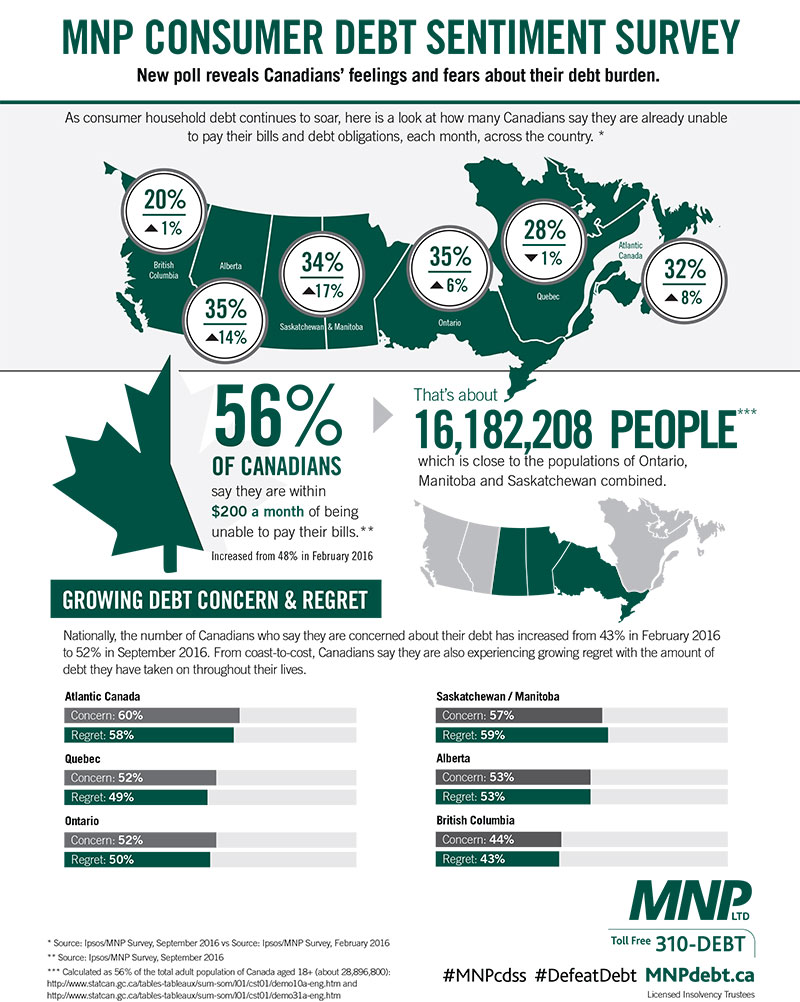Sixty-four per cent of Saskatchewan and Manitoba residents say they are now living within $200 a month of being unable to pay their bills and debt payments each month
MNP Consumer Debt Sentiment Survey reveals serious concern about debt in Saskatchewan and Manitoba:
- Fifty-seven per cent are concerned about their current level of debt (a jump of 14 points since February).
- Thirty-four per cent say they already don’t make enough to cover their bills and debt payments. This number is up 17 points since February and represents the largest jump in the country.
- Regret about debt is strongest in Saskatchewan and Manitoba compared to other provinces, with fifty-nine percent saying they regret the amount of debt they’ve taken on (up 15 points since February).
Regina, SK – A huge portion of residents of Saskatchewan and Manitoba are concerned about their level of debt and their ability to meet their payment obligations. Sixty-four per cent of residents now say they are $200 or less per month away from not being able to meet all of their bills or debt obligations each month. Thirty-four per cent of this group say they already don’t make enough money to cover their bills and debt payments, technically making them financially insolvent. Both figures jumped 17 points since the poll was conducted in February 2016, some of the largest increases in the country compared to other provinces.
The findings are a part of the MNP Consumer Debt Sentiment Survey, a semi-annual poll designed to track Canadians’ feelings about their debt and their perception of their ability to meet their monthly payment obligations. Fifty-seven per cent of respondents in Saskatchewan and Manitoba said they are concerned about their current level of debt, the second highest proportion in the country behind Atlantic Canada. That number represents an increase of 14 points since February 2016. For many, this is prompting some soul-searching, with fifty-nine per cent also now indicating that they regret the amount of debt that they have taken on, the largest proportion in the country. Ian Schofield, a Saskatchewan-based licensed insolvency trustee with MNP Debt, says that the results are a clear indication that the majority are starting to feel the effects of the oil price plunge and not just those who were laid off as a direct result of the job losses in the Western Canadian oil industry.
“Laid-off oil workers and their families aren’t the only ones hurting now. The slowdown effects have trickled-down to everyone from retailers, to restaurants and virtually every business. Over sixty percent indicated that they have less than $200 of ‘wiggle room’ before they would be unable to pay their bills. That’s a huge portion of people who are tremendously vulnerable to any kind of economic shock like an emergency, a divorce, a health issue, or an increase in interest rates,” said Schofield.
The survey showed that there has been a significant jump in the number of people in Saskatchewan and Manitoba concerned about the potential of rising interest rates. Forty-one per cent now say they are concerned that an increase in interest rates could move them towards bankruptcy. That number is up sixteen points since the February 2016 survey.
Despite the anxiety around debt, over-spending remains a reality. Forty-three per cent of parents in Saskatchewan and Manitoba said they spent more than budgeted on back-to-school shopping for their kids, thirty-eight per cent ‘agree’ they spent over budget on recreation or vacations during the summer.
“Many are spending themselves into devastation, relying on cheap credit to subsidize their income and fund their lifestyles during the downturn. Worse yet, some are taking out payday loans. Those who are living on credit should seek professional help now. It’s not sustainable especially if and when interest rates rise. One of the biggest mistakes people make is waiting until the point of devastation before getting help,” said Schofield.
Other key poll highlights include:
- Fifty-six per cent of Canadians now say they are $200 or less per month away from not being able to meet all of their bills or debt obligations each month, including 31 per cent who say they already don’t make enough money to cover them, technically making them financially insolvent. The proportion of Canadians who say they can’t pay their bills is up 5 points since early 2016 and 10 points since February 2015.
- The concern about the potential for rising interest rates has increased among Canadians. Thirty-eight per cent say they are concerned an increase in interest rates could move them towards bankruptcy, compared to only thirty-one per cent back in February 2016.
- Parents are more likely to be concerned about their debt situation than other Canadians: six in ten (60 per cent) parents are concerned with their level of debt.
- Debt concerns are also much stronger among middle-aged Canadians; six in ten (60%) Gen X’ers are concerned about their debt situation, compared to 52% of Millennials and 43% of Baby Boomers.
- Concern about debt is strongest in the Atlantic provinces where 60 per cent worry about their current debt load, compared with 57 per cent of those in Saskatchewan and Manitoba, 53 per cent in Alberta, 52 per cent in Ontario, 52 per cent in Quebec, and 44 per cent in BC.
- Feelings of regret about debt are most present in Saskatchewan and Manitoba (59 per cent), followed closely by the Atlantic Provinces (58 per cent), Alberta (53 per cent), Ontario (50 per cent), Quebec (49 per cent) and BC (43 per cent).
- In Alberta there was an eighteen point increase in the number of residents who said they are $200 or less per month away from not being able to meet their bills each month. That represented the largest jump across the country followed closely by Saskatchewan and Manitoba (17 per cent).
- Residents of Ontario (35 per cent) and Alberta (35 per cent) are the most likely to describe themselves as financially insolvent, followed closely by Saskatchewan and Manitoba (34 per cent), the Atlantic provinces (32 per cent), Quebec (28 per cent) and BC (20 per cent).
About MNP Debt
MNP LTD, a division of MNP LLP, is one of the largest personal insolvency practices in Canada. For more than 50 years, our experienced team of Licensed Insolvency Trustees and advisors have been working collaboratively with individuals to help them recover from times of financial distress and regain control of their finances. With more than 200 Canadian offices from coast-to-coast, MNP helps thousands of Canadians each year who are struggling with an overwhelming amount of debt. Visit www.MNPdebt.ca to learn more.
About the MNP Consumer Debt Sentiment Survey
Now in its second year, the MNP Consumer Debt Sentiment Survey is a semi-annual poll designed to track Canadians’ feelings about their debt and their perception of their ability to meet their monthly payment obligations.
The survey was conducted by Ipsos on behalf of MNP Debt between September 6 and September 12, 2016. For this survey, a sample of 1,502 Canadians from Ipsos' online panel was interviewed online. Weighting was then employed to balance demographics to ensure that the sample's composition reflects that of the adult population according to Census data and to provide results intended to approximate the sample universe. The precision of Ipsos online polls is measured using a credibility interval. In this case, the poll is accurate to within +/ - 2.9 percentage points, 19 times out of 20, had all Canadian adults been polled. The credibility interval will be wider among subsets of the population.
Latest Blog Posts
2025-10-06
Caryl Newbery-Mitchell
MNP Consumer Debt Index
Ontarians’ financial vulnerability is intensifying as persistent economic uncertainty, concerns about borrowing costs, and employment anxiety weigh on household confidence.
Read More
arrow_forward
2025-10-06
Pamela Meger
MNP Consumer Debt Index
The financial vulnerability of Saskatchewan and Manitoba residents is intensifying as their financial cushions shrink and more households edge closer to insolvency.
Read More
arrow_forward
2025-10-06
Lindsay Burchill
MNP Consumer Debt Index
Albertans’ financial vulnerability is intensifying as persistent economic uncertainty, concerns about borrowing costs, and employment anxiety weigh on household confidence.
Read More
arrow_forward



